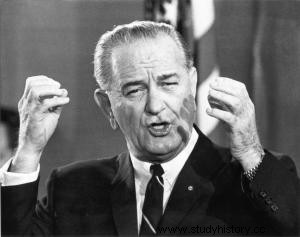
It is (...) a very real question", that "to know" if it will be possible to continue our efforts in South Vietnam for the time necessary to achieve our objectives there.
This is what Secretary of Defense McNamara wrote to President Johnson as 1967 drew to a close. Fearing that neither a large increase in American combat troops nor increased bombardment of North Vietnam would achieve victory or force the North Vietnamese to negotiate, he wondered:how much longer would the American people continue- Was it to accept these heavy losses and this gigantic drain on national resources?
The only solution McNamara put forward was to stop the bombardment and declare that the United States would not increase its forces :a way like any other to demonstrate to world opinion that the United States was not responsible for the obstacles blocking the path to peace. Concurrently, the United States would reduce its ground operations to the bare minimum necessary to maintain security, which would diminish American casualties and strengthen South Vietnamese forces so that they could assume increasing responsibility in the conduct of the war. /P>
McNamara's memorandum caused major divisions in the Johnson administration. The Pentagon military strongly opposed it. Some disagreements arose even among Johnson's civilian advisers; most, however, including so-called "hawks" like Secretary of State Dean Rusk and Special Adviser on National Security Affairs Walt W. Rostow, were broadly supportive of McNamara's attitude.
After having recalled in consultation in Hanoi, in July 1967, the North Vietnamese diplomats of the whole world, Ho Chi Minh, Vô Nguyen Giap and the other leaders of Hanoi took, as General Westmoreland will rightly guess subsequently, "a crucial decision concerning the conduct of the war". They decided to launch a general offensive in South Vietnam. To ensure the obedience of the commanders and their troops, the Communist leaders described the offensive with emphasis. When the Vietcong and North Vietnamese troops attacked all of South Vietnamese territory—especially the city-states which had hitherto been spared artillery bombardments and terrorist operations—the Communist underground network of the South would surface and , with the help of Southern sympathizers, would seize local power, overthrow the Thieu-Ky tandem regime and end the war.
The degree of sincerity of the North Vietnamese leaders when they considered being able to provoke the general uprising of the South Vietnamese people. But there was more important:the effect this mighty offensive would have on the Americans. The North Vietnamese could hardly ignore the growing disenchantment engendered by the war in the United States. A catastrophic military defeat in an election year, the enormous increase in American and South Vietnamese losses, proof that the South Vietnamese were unable to bear the burden of the war on their own, all of this could very well lead to a second Dien Bien Phu... The United States would decide that there was no possible victory, except at a price that the American people did not want to pay. Then the North Vietnamese would sit down at the negotiating table, knowing that the Americans would make almost any concessions desired in order to end the conflict.
But for the offensive to succeed, it The surprise had to be total. Several means existed for this purpose. Above all, the Vietcong and the North Vietnamese were past masters in the art of gathering men and materials slowly, systematically, secretly.
However, thanks to their reconnaissance devices and their other sophisticated intelligence techniques, the Americans risked discovering the master plan of the Communists—unless some spectacular diversionary action concealed it. The history of Vietnam contained a precious antecedent in this case:in the year 1789, the
forces of the leaders of the Tay Son mountain people attacked the Chinese troops occupying Hanoi and obtained both the surprise and victory by launching the operation at the most unexpected time, namely the sacred period of Tet, the Lunar New Year.
Few Western nations know such an important festival for their people as east is Tet for the Vietnamese. This is not just a time of festivities — fireworks and street parties; it is also a time of veneration of the ancestors, around the family altar. For several days, the whole country moves, people visit their ancestral homes, and all business — including war business — comes to a standstill. The Communists figured that very few South Vietnamese—and certainly no Americans—would remember the events of 1789. So how better to ensure total surprise than by launching the offensive at the start of the Tet holiday—for which, moreover, the Vietcong had already declared a truce from January 27 to February 3?
